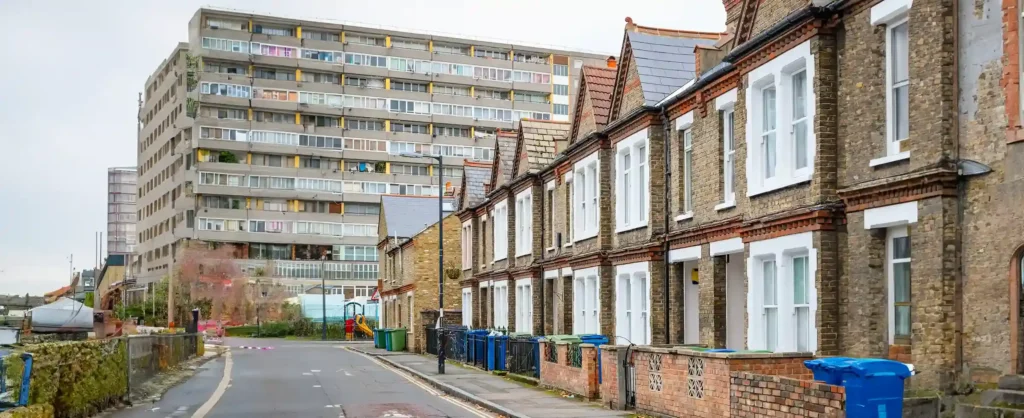When COVID-19 first made headlines in 2020, few could have predicted how quickly and surely it would evolve into a pandemic. Fewer still could have guessed that it would lead to a lockdown that would imperil our day-to-day lives, permanently changing the status quo and forcing us to adapt to its new reality. While we are all aware of COVID-19’s impact on healthcare and politics, the lasting effect of the pandemic on the housing market and mortgage rates is a subtler subject.
During the first year of the COVID-19 outbreak, experts predicted that it would most likely take the UK economy until 2024 to recover from its impact and return to pre-pandemic levels fully. Since then, the housing market has fluctuated heavily thanks to the knock-on effect of COVID on the global economy and more recent developments like last year’s mortgage crisis.
But what are the specific implications of COVID-19 on the housing market? And will 2024 see the return to normality predicted back when it all began? For a breakdown of the lockdown and the housing market changes that have happened since Concept Capital Group may be the best medicine.
How the Housing Market Responded to COVID
How It Started
Caught off-guard by the suddenness of the COVID-19 pandemic and forced to adjust just as abruptly, stakeholders in the UK housing market found themselves subject to a round of systemic changes that left a lasting impact on housing affordability and stability.
At the beginning of the COVID lockdown, a record spike in tenant evictions caused immediate concern among renters and highlighted the need for a ‘pandemic-proof’ social safety net. Despite promises to halt evictions for three months, a combination of reduced job security and uneasiness on the part of landlords led to 20,000 evictions being processed in short order once the lockdown officially commenced. Housing charity, Shelter, even warned that the end of the lockdown would lead to a “tsunami of evictions” once landlords were no longer bound by its clemency period.
Then the recently appointed Chancellor of the Exchequer, Rishi Sunak announced a stamp duty holiday a few short months into the lockdown. Introduced as part of a £9 billion pledge to maintain a sense of stability and security throughout the lockdown, the stamp duty holiday was intended to ‘un-freeze’ the stagnant housing market by encouraging construction and home sales.
How It Ended
In light of the stamp duty holiday, and with newly remote workers leading the charge, London saw its biggest homeowner exodus in four years. A collective £27.6 billion was spent by London leaders moving from the nation’s capital to more rural areas, and the resulting dip in demand led to private rent in Britain’s urban areas falling by as much as 15%, with London itself seeing falls of up to 34% in some areas.
By the time the first year of lockdown had concluded, an estimated 840,000 private renters had fallen behind on rental payments and a rent arrears crisis seemed imminent. As Shelter had warned months prior, the end of the COVID eviction ban threatened to put almost two million renters at risk of poverty. On the other hand, thousands of borrowers took out ‘marathon loans’ of at least 35 years to take advantage of the stamp duty holiday or to keep up with rising costs
Overall, the ebbs and flows of COVID saw house prices rise by 20.4% between 2020-23, according to Halifax. When compared to the 7.8% rise observed in the three years leading to 2020, this suggests that the pandemic dramatically skewed the housing market in terms of pricing.
Post-COVID: The Road to Recovery
Since the first lockdown, the housing market has been on a slow route to recovery. Although late 2023 saw home sales recover to near pre-COVID levels, the instability left in the pandemic’s wake pushed many long-spanning issues within the housing market to a tipping point while calling its ability to recover from those issues into question.
As a 2022 Financial Stability Report by the Bank of England observed, house prices continued to grow throughout the pandemic to reach their highest rate in over a decade. While much of this growth can be attributed to the economic measures put in place during the pandemic, excessive mortgage debt is also a factor. This brought a greater financial risk to the housing market over time. A 2023 article released by the Financial Times underscored this threat, with brokers warning of a housing market crash resulting from excessive post-COVID debt.
Leading building society, HSBC, has dubbed the looming financial crash caused by opportunistic mortgaging during the pandemic the ‘COVID Maturity Wall’ and suggests that a wave of refinancing on COVID-era mortgages in 2024 and 2025 could place undue stress on the housing market and its stakeholders. Analysis from investment firm, Goldman Sachs, supports this forecast, with a shift in fiscal policy and other lingering ‘COVIDisms’ expected to slow the UK’s economic growth much more than the rest of Europe or the United States.
Between 2017 and 2022, the number of people experiencing destitution in the UK increased by 148%, with many tying the increased levels of austerity and poverty directly to the COVID-19 pandemic. This explosion of financial pressure eventually spilt out of the home and into the streets, with Shelter reporting that homelessness had reached its highest levels since records began last year.
Is There a Silver Lining?
Things are not all doom and gloom for the post-COVID housing market, however. According to a press release by Zoopla, UK buyer demand is up by 12% and the supply of homes available for sale is 22% higher than a year ago, suggesting increased confidence among buyers and sellers. This is despite recent data suggesting that housebuilding had stalled during COVID. As explored in one of our recent blogs, this year may even see a higher-than-average ‘bounce’ in property prices over the next few months.
Still, with the Office for National Statistics (ONS) reporting that the costs of both buying and selling a home increased last year and 40% of adults reporting that it was very or somewhat difficult to afford mortgage or rent payments, full COVID recovery could still be a ways off for the housing market.
Helping Out the Housing Market With Concept Capital Group
According to data modelling by epidemiologists, there is a 38% chance that we will experience another pandemic in our lifetime. With the global economy projected to have lost a total of $12 trillion to COVID by the end of 2024, the World Health Organisation has further warned that the UK is less prepared for a pandemic than it was before COVID. Another similarly unexpected twist on the status quo could spell disaster for the UK in its current state, meaning that it is more important than ever for private investors to support affordable housebuilding and the housing market in general.
At Concept Capital Group, we build fully functional, high-quality modular homes for private investors hoping to expand their portfolio into the ever-growing market of affordable housing. With a low entry point and consistent, long-term returns, our mortgage-free property investment opportunities are readily accessible to investors from a range of financial backgrounds. Our 360-degree property management services also ensure that you can invest from anywhere in the world and receive your profits without having to worry about day-to-day maintenance.
For more on investing in affordable homes, book a call with our team today.













